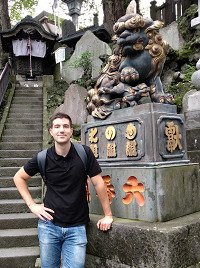An international research experience in Tokyo
As a doctoral student at KI there are different possibilities to have an international experience at another lab or taking a course. Julen Goicolea took the opportunity to go to Japan.

There are different kind of financial sources, one is the KI Foundations & Funds which manages approx. 250 foundations and funds, which are comprised of both donations and bequests to KI. Another option can be to apply for scholarship from another organisation. A doctoral student who applied to the Japanese organisation Japan Society for Promotion of Science’s JSPS Summer Program was Julen Goicolea. He got a scholarship to do conduct research at a lab at the University of Tokyo during two months in the summer of 2018.
What is my area of research?
I work in the Department of Neurobiology, Care Sciences and Society where we study the mechanisms behind risk factors for Alzheimer´s Disease. Specifically, the project that brought me to Japan is focused on studying a protein called Thioredoxin-80. The biological function of Thioredoxin-80 is not completely clear yet but we have seen that this protein is depleted in cases of Alzheimer´s Disease. Our research showed that Thioredoxin-80 might be implicated in a cellular process called autophagy. This is a mechanism by which cells degrade unnecessary or dysfunctional intracellular components. We also know that autophagy is impaired or altered in several neurodegenerative diseases like Alzheimer´s Disease. Due to this, we decided to study more specifically the effect of Thioredoxin-80 on autophagy.
Why I chose Tokyo?
Autophagy is an important research field in Japan even before Professor Ohsumi got the Nobel prize in 2016. A colleague of mine told me about his previous research experience in that country provided by the JSPS Postdoctoral fellowship for Research in Japan. So I decided to apply for this grant to learn about autophagy in a group that is focused on this kind of research. I contacted Professor Mizushima to join his lab for the internship and he agreed.
How was it to stay at UTokyo for two months?
It was a great experience. The lab was in Hongo campus, in the faculty of Medicine Experimental Research building. This campus is worth visiting since it is full of green spaces and some monuments such as the Red Gate. Even though I went there during summertime, the campus was very lively and full of people. Once a week in the evening there were scientific seminars and lectures given by world-class researchers.
I got a very nice and affordable studio from the university housing. The studio is in the Komaba campus, which is very centric. All the housing and internship paperwork was very efficiently handled for me by the lab secretary so I could focus on my work.
What was the major differences between KI and UTokyo?
This is a difficult question to answer since I didn't spend enough time in Tokyo but I would say that they have a different working culture/philosophy to what we have here in KI. Also, I felt everybody there was willing to help me anytime, and this is something you really appreciate when you go to a country for the first time where the culture the language and everything is so different from anything you have seen before.
Do you have any advice for students going abroad?
Do not waste your time. Work, learn and travel as much as you can. Be open-minded and experience this amazing country every single day of your stay. It is totally worth it. This whole program is a unique experience that nobody should miss.
Where to start? The best place to start is with your KI network, whether your supervisor or another friendly prof/colleague in your department or faculty. Professors have broad international networks and may have colleagues in universities of interest. They can also help you in reaching to international colleagues who might be interested in supervising your project. Whether a connection is geographic, professional, or personal, your professor’s network is the best starting point for finding an international supervisor for your collaboration and lab visit.
